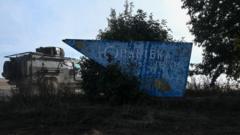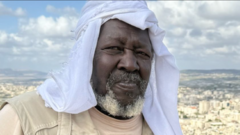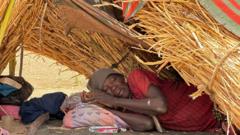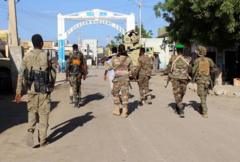Abu Khalid, an alleged participant in recent sectarian violence against Alawites in Syria, claims that government forces monitored and directed civilians aiding in the violence. Reports indicate widespread killings of Alawites and escalation of sectarian tensions following insurgent attacks.
Government Forces Linked to Sectarian Violence Against Alawites in Syria
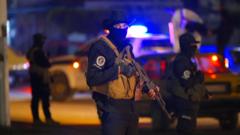
Government Forces Linked to Sectarian Violence Against Alawites in Syria
An accused civilian fighter reveals oversight by state security forces during waves of deadly attacks on Alawite communities.
In an alarming revelation, one of the men accused of participating in the violent attacks against Syria's Alawite minority alleges that state security forces were not only aware of but also provided oversight for the armed civilians involved. The man, identified as Abu Khalid, shared his story during an interview, shedding light on the role of government forces during the recent surge of sectarian violence that gripped the coastal region of Syria.
Abu Khalid recounted his journey as a civilian combatant on March 7, when he moved to the coastal village of Sanobar to join forces against former regime insurgents. "The General Security department told us not to harm civilians, but only to shoot at insurgents who shot at us," he said, referring to the guidance given to him and his companions. However, his involvement turned tragic when he filmed himself executing a local resident, Mahmoud Yusef Mohammed, whom he claimed was an armed insurgent – a claim strongly contradicted by the footage.
Human rights advocates report nearly 900 civilians, predominantly Alawites, were killed in the days surrounding the wave of attacks, as tensions escalated after former President Bashar al-Assad's loyalists initiated violent encounters with government forces. This violence elicited retaliatory strikes against the Alawite population, seen by some factions as complicit in the regime's past actions.
Witness accounts from survivors in Sanobar depict the chaos and horror that engulfed the village, with armed groups moving in to execute Alawites on mere suspicion of complicity with former regime forces. "They stole everything, insulted us, threatened the children," recollected one survivor, recounting a harrowing experience of witnessing family members being executed in front of her.
Meanwhile, Abu Khalid expresses little remorse for his actions, attributing his violence to a backdrop of personal loss from earlier regime attacks. Presently in military custody pending investigation, he continues to justify his actions as retaliation for past grievances rather than acknowledging the executioner's role he assumed amidst chaotic military operations.
The Syrian Network for Human Rights has recorded that former regime loyalists are responsible for a significant number of civilian casualties during the surreal violence that unfolded, with claims of brutal bloodshed driven by deeply entrenched sectarian discord. The seismic shifts in security dynamics following insurgent-led provocations have left lingering fears among minority populations, questioning the potential for justice and reconciliation in a country shadowed by a history of violence and reprisal.
As the new Islamist-led government grapples with these incendiary sectarian divisions, the call for accountability and protection has become crucial, especially for vulnerable groups under direct threat. The recent events in Sanobar could foreshadow broader implications for the future stability and governance of Syria as various factions vie for power amid an unyielding cycle of revenge and survival.

